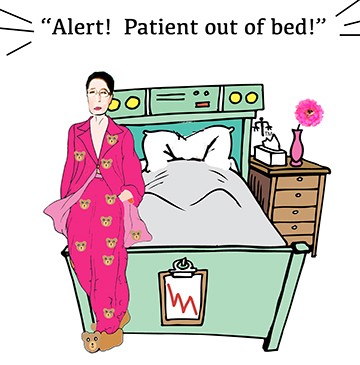My hospital stay was not as expected |
|
During my six hours in the emergency room (ER) waiting to be assigned an in-patient room, it was apparent to me that doctors have become an endangered species in their natural habitat. They are being replaced by nationally-certified and state-licensed physician assistants (PA), who practice and prescribe medication in all 50 states. It was a PA who stopped by my gurney to tell me that my chest x-ray was positive for pneumonia, and to assure me that I was receiving the correct IV antibiotics, despite earlier confusion over my medical history. (See part one) This was nice to know, but a minimal expectation. It was after 10 p.m. when I was finally transported to my hospital room. I considered asking for a very late check-in discount, but it was too late for humor. My night nurse was awaiting my arrival, and immediately asked me for the Parkinson's meds the ER staff noted I had brought from home. "Nay, nay," I muttered to myself, recalling survey findings that three out of four people with Parkinson's do not get their medications on time when hospitalized, often resulting in serious adverse side effects. Had I depended on the ER staff to bring me my meds, I would have been late receiving both doses due me since I arrived at the hospital. Unwilling to risk becoming a statistic, I told the nurse I would handle my own dosing – end of discussion. She acquiesced, but only after my husband agreed to bring in my meds in their original bottles so the hospital pharmacy could relable and store them in a locked dresser drawer in my room. Seeing as how I did not have a key to this drawer, the proposal did nothing to address my concern. No problem, I had a stash of meds organized in little plastic baggies in my purse and would continue to take them. I didn't even get to sleep before the next issue arose – I needed to use the bathroom. I barely stood up when an alarm, loud enough to wake the dead, sounded. A bevy of medical personnel rushed into my room as if responding to a code blue.
|
No one told me that the bed was alarmed and set to detect changes in weight. Good thing my husband, Tony, hadn't left his day bed to join me in my bed tipping the scale in the other direction. Come morning, I was greeted by a respiratory therapist who brought me a plastic blow pipe to use for breathing treatments. He showed me what to do, but I just couldn't get the hang of it. "I wasn't any good at this in college, and I am even worse now," I told him. Thinking that a little mood music might work, I took out my cell phone and pulled up Peter, Paul, and Mary singing, "Puff the Magic Dragon." What do you know… it worked. It was almost a full 24 hours from the time I entered the ER until I saw a doctor, with "a" being the operative word. Not only was he not my family physician, I had never even laid eyes on him before. He handed me his business card identifying himself as a hospitalist, a doctor who specializes in the practice of hospital medicine. As such, he is authorized to act as my internist's representative in hospital settings. I understand how this arrangement is more cost-efficient and convenient for hospitals and doctor, but as a patient, I didn't feel the warmth or have the trust I do in a doctor of my choosing with whom I have a history. If this is the new bedside manner and best practices medicine, it is a poor substitute for the old. I long for the days of tv docs like Marcus Welby, who made house calls if necessary.
|
email us directly at: Sheryl@pdplan4life.com (c) 2015 PDPlan LLC All Rights Reserved Without express written consent, this material may only be used for your own personal and noncommercial uses which do not harm the reputation of PDPlan LLC, provided that you do not remove any copyright. To request permission to reproduce, please contact PDPlan LLC at Sheryl@pdplan4life.com |
 |
 |



